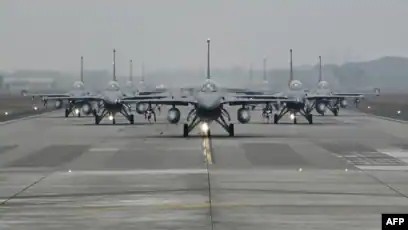Taipei February 24 2022: As Taiwan continues to face a military threat from China, Foreign Minister Joseph Wu said this week the Taiwanese government continues to focus on its “asymmetric defense” capability — including U.S. assistance — to make it an unattractive target, despite its limited military power.
Taiwan’s current strategy is to make certain “China will understand it will pay a very heavy price if it initiates conflict against Taiwan,” Wu said during a virtual event hosted by the McCain Institute for International Leadership at Arizona State University.
A L S O || R E A D
Ukraine shuts ports as conflict threatens grain supplies
Speaking with former U.S. Secretary of Defense Mark Esper, Wu argued for continued U.S. support of Taiwan through arms sales, military exchanges, shared intelligence, and freedom of navigation exercises in the Taiwan Strait.
“We want the people here in Taiwan to be able to defend themselves if China is going to launch a war against Taiwan,” Wu said.
Taiwan has lived under the threat of military action by China since China’s Nationalist Party, the Kuomintang fled the mainland after losing the Chinese civil war in 1949. While the conflict has remained largely a stalemate since then — with Beijing continuing to claim Taiwan as a province — an aggressive military modernization campaign by China means it could be able to attack Taiwan as early as 2027, according to the U.S. Defense Department.
Wu said China could have the potential to attack targets other than Taiwan in the future.
“China has made so much investment and have modernized their military capable of not only striking at Taiwan but go beyond the first island chain, so we need to develop our asymmetric warfare so that Taiwan is able to defend itself,” he said, referring to the name of the defensive barrier of Taiwan, Japan, Okinawa, and the northern Philippines.
Similar concerns have led the United States as well as France, Japan, Australia, India, South Korea, the Philippines, and the European Union to become more vocal about the future of Indo-Pacific security in the face of a rising China. Earlier this month, Washington released its latest Indo-Pacific strategy, which called for greater cooperation with regional partners.
Wu said Taiwan must be “very careful” to not provoke China and trigger a conflict. The most recent incident occurred in 1995 and 1996, when China fired missiles toward Taiwan ahead of its first democratic elections. Future triggers could include a formal declaration of independence by Taiwan from China, which is why leaders such as President Tsai Ing-wen are extremely careful when they discuss Taiwan’s political status.
Wu said domestic problems could also force Beijing’s hand if it needed to unite China against a common enemy. “We also need to watch out for this classical theory about authoritarian countries. They like to divert domestic attention by initiating external conflict. If something is happening in China, inside their country, for example, economic slowdown, unemployment, or major disasters, things like that, that might be the time that we need to watch very carefully,” he said.
In the meantime, Taiwan continues to face Chinese efforts to sway public opinion and destroy morale from within Taiwan by convincing civilians “democracy is doomed.” Tactics have included more than 1,000 Chinese People’s Liberation Army air sorties toward Taiwan last year, Wu said, as well as disinformation campaigns and political infiltration.
Wu said these tactics are “below the thresholds of a military conflict” but still require Taiwan and allies such as the United States to keep pushing back.
Events like Wu’s talk at the McCain Institute are part of Taiwan’s greater public relations strategy to remain a central concern for both the U.S. government and the U.S. public, said Kitsch Liao Yen-fan, a cyber and military affairs consultant at the Taiwanese civil society group Doublethink Lab.
Liao said this was a particular concern for Taiwan after the U.S. withdrawal from Afghanistan last year, as the U.S. public may not want to see its military send troops to another foreign conflict. While the United States is not formally committed to defending Taiwan if it were attacked, under the 1979 Taiwan Relations Act it has pledged to help it defend itself.
Whether this would ever extend to sending U.S. personnel to Taiwan in a wartime scenario, however, is still a topic of debate — and a decision that Taipei hopes to influence.
Talks like those by Wu, however, “create sufficient momentum to tip public opinion on Taiwan’s side, and on the political side of the United States to reach a tipping point where the willingness to actually send the military into the next conflict will be reversed again,” said Liao










